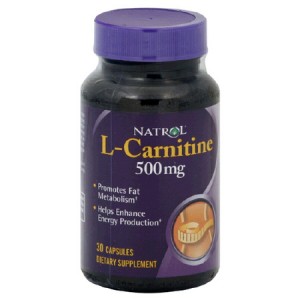
March 15, 2010
L-Carnitine: Help or Hype?
L-Carnitine has been a popular supplement in bodybuilding and weight loss circles for many years, and it has recently seen renewed interest from its inclusion in the many “energy drinks” on the market. That begs the question: are there any benefits to carnitine supplementation? To answer this question, let’s first start with a little physiology on the substance…

Carnitine is synthesized in the liver and kidneys from the essential amino acids lysine and methionine. It also can be obtained intact from whole foods such as avocados, red meat, and various dairy products. The primary function of carnitine is to transfer fatty acids across the mitochondrial membrane so they can be oxidized to produce energy. Thus, it is integrally involved in the fat burning process, as well as helping to enhance energy levels and reduce muscular fatigue.
From a hypothetical perspective, carnitine supplementation makes sense on the surface. First, because of its role in facilitating transport of fatty acids into the mitochondria (the body’s “cellular furnace”), an elevated level of carnitine would seem to permit a greater amount of fat to be burned by the body. In addition to accelerating weight loss, this would also help to spare muscle glycogen, thereby improving exercise performance. Moreover, since carnitine plays a role in buffering lactic acid, supplementing could theoretically prolong your ability to work out at intense levels. And carnitine has various cardiovascular benefits, including the reduction of blood cholesterol and lipids. All things considered, supplementation might sound like a good idea, right?
Unfortunately, theory doesn’t transfer into practice here. The vast majority of studies have shown little or no benefit of carnitine supplementation in healthy, well-nourished individuals. There appears to be a critical level for carnitine build up, above which it provides no additional effect. While supplementation does increase blood levels of carnitine, there is not a corresponding increase in transport of fats into the mitochondria, and thus fat burning capacity is not enhanced. Provided you take in sufficient dietary protein (equating to approximately one gram per pound of body weight), the overwhelming likelihood is that you will synthesize all the carnitine your body needs. And given that carnitine is quite expensive, supplementation just doesn’t provide a good cost/benefit.
The only instance where supplementation may be beneficial is if, by chance, you happen to have a carnitine deficiency. Those most at risk for being deficient include vegans, vegetarians, breast-feeding women, and individuals on very low calorie diets. Should you fall into one of these categories, it’s possible that carnitine can be of value. Standard dosage is to take between two and four grams of carnitine approximately one hour before exercise. Again, more is not better—once you reach the saturation point, any additional intake will be superfluous. And assuming you are not deficient (as is the case with the vast majority of the public), save your money.
Stay Fit!
Brad
7 Comments
RSS feed for comments on this post.
Sorry, the comment form is closed at this time.





 Entries (RSS)
Entries (RSS)




The Primary Function Of Carnitine
[…] the carnitine your body needs. And given that carnitine is quite expensive, supp […]
Trackback by Judoj Blog — July 12, 2016 @ 7:34 pm
The Primary Function Of Carnitine
[…] hich it provides no additional effect. While supplementation does increase blood […]
Trackback by Onhin Blog — August 9, 2016 @ 8:29 pm
The Primary Function Of Carnitine
[…] ria, and thus fat burning capacity is not enhanced. Provided you take in suffici […]
Trackback by Ebgud Blog — August 25, 2016 @ 4:06 pm
The Primary Function Of Carnitine
[…] n that carnitine is quite expensive, supplementation just doesn’t provide a go […]
Trackback by Gegul Blog — September 13, 2016 @ 6:34 pm
The Primary Function Of Carnitine
[…] dietary protein (equating to approximately one gram per pound of body weight), t […]
Trackback by Super Blog — September 19, 2016 @ 12:09 am
The Primary Function Of Carnitine
[…] build up, above which it provides no additional effect. While supplementation do […]
Trackback by Vegetarian Blog — November 11, 2016 @ 1:58 pm
The Primary Function Of Carnitine
[…] t dietary protein (equating to approximately one gram per pound of body weight), […]
Trackback by Spirit Blog — December 4, 2016 @ 1:16 am